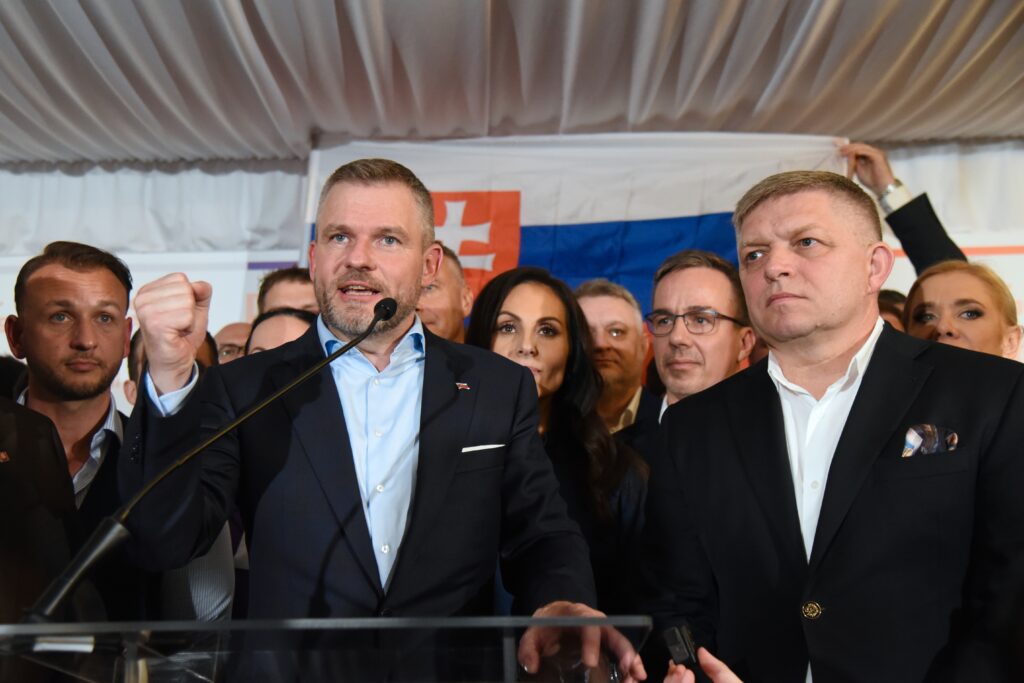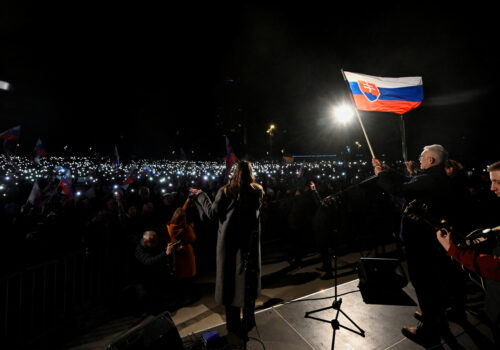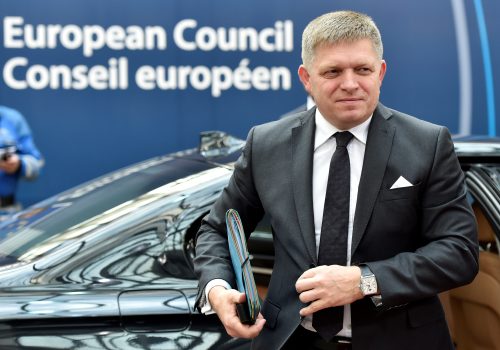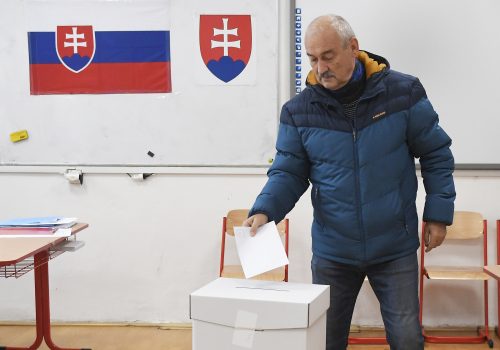On April 6, Slovakia voted in a populist, Moscow-friendly president, potentially accelerating the erosion of the country’s democratic values and possibly increasing Russia’s influence over Bratislava.
In a closely watched second-round presidential race, Slovaks cast their ballots in what evolved into a tight face-off between Ivan Korčok, a career diplomat advocating pro-Western ideals and staunch support for Ukraine, and Peter Pellegrini, who has echoed pro-Kremlin rhetoric and is aligned with the current Slovak government led by Prime Minister Robert Fico. Fico, who took office last October, has caused alarm among NATO allies for opposing aid to Kyiv during his campaign, parroting Kremlin talking points on the war in Ukraine, and threatening his country’s independent judiciary.
While the presidency wields limited powers, the race earlier this month was broadly seen as a poignant battleground between political factions harboring opposing views on domestic rule-of-law issues and Russia’s war on Ukraine.
The election of a president who is unlikely to check the prime minister’s executive power leaves Fico’s administration in a new position.
The president has the authority to veto laws—albeit subject to potential override by parliament with a simple majority—and can dispute them at the constitutional court. The president also appoints constitutional court judges, selects the prime minister, swears in the new government after parliamentary elections, and can pardon convicts. With Pellegrini’s victory, Fico and his allies’ control extends not just over the legislative and executive branches, but also over these presidential authorities.
Initially expected to be a tight race, Pellegrini won with an unexpected 6 percent lead and 53 percent of the total vote. Despite Korčok’s commendable efforts to rally support against the incumbent administration’s policies, Pellegrini emerged victorious, leaving many pondering the implications for Slovakia’s future.
While each candidate garnered more than one million votes for the first time ever in a Slovak presidential race, Pellegrini’s success can be attributed to several key factors. He adeptly tapped into widespread anti-Western and anti-liberal sentiments across the nation, especially in areas where the ruling, populist coalition parties had previously performed well. Moreover, he consolidated support from voters who backed candidates eliminated in the initial round. A historic voter turnout in the second round exceeding 60 percent further bolstered his campaign, as he successfully mobilized new constituencies.
During the campaign, Pellegrini painted Korčok as a harbinger of war—asserting that Korčok’s victory would drag the country into a war with Russia—while he positioned himself as a proponent of peace. This narrative was bolstered by misleading social media posts, which were spread on the social media accounts of prominent government officials—including Slovakia’s ministers of economy, European Union (EU) funds, and regional development—which swayed public opinion and contributed to Korčok’s defeat.
Korčok did triumph in the capital region, Bratislava, which also boasted the highest election turnout nationwide with over 71 percent. He also won the support of younger voters, who were able to see through the disinformation campaign against him.
With Pellegrini’s victory, concerns have been mounting regarding the unchecked advancement of the government’s antidemocratic agenda and closer ties with Russia. The outgoing president, Zuzana Čaputová, habitually exercised her presidential powers to limit the executive arm, both with the current and previous administrations.
The election of a president who is unlikely to check the prime minister’s executive power leaves Fico’s administration in a new position. It might now feel emboldened to accelerate efforts to undermine judicial independence, media autonomy, and democratic oversight—unless it is restrained by external forces, notably Brussels.
The European Commission has warned Bratislava that it could face penalties over concerns that the Fico administration’s judicial reforms—particularly those shielding politicians from prosecution—were incompatible with the EU’s democratic standards. This would place Slovakia alongside Poland and Hungary, both of which have been embroiled in prolonged disputes with the EU over the rule of law. The potential withholding of EU funds constitutes significant leverage, particularly as Slovakia faces the eurozone’s biggest budget deficit, projected at over 6 percent of the country’s gross domestic product this year.
Slovakia’s geopolitical realignment is equally likely to reverberate on the international stage. Bratislava’s continued drift into the Russian orbit of influence is sure to pose fresh challenges for regional stability, European unity on support for Kyiv, and transatlantic relations.
Korčok’s defeat represents more than a missed opportunity for principled leadership in a geopolitically crucial region. It signifies a worrisome shift in Slovakia’s democratic trajectory away from Western norms, raising alarms not just about the country’s future course but also Europe’s internal stability, cohesion, and decision making.
Soňa Muzikárová is a political economist focused on Central and Eastern Europe and a nonresident senior fellow at the Atlantic Council’s Europe Center.
Further reading
Wed, Apr 3, 2024
Your primer on Slovakia’s presidential election
Eye on Europe's elections By Emma Nix, Patrik Martínek
As Slovakia prepares to select its next president in an election that could determine the country's Euro-Atlantic orientation for the next five years, the Europe Center breaks down the key dynamics at play.
Fri, Dec 23, 2022
Slovakia risks becoming another Hungary-style EU spoiler. How should the West respond?
New Atlanticist By Petr Tůma
The transatlantic community should motivate the opponents of nationalist Robert Fico to get together to prevent a Slovak shift toward Hungary and Russia.
Fri, Sep 22, 2023
Your primer on the Slovak elections
Eye on Europe's elections By
Ahead of the Slovak elections, the Europe Center is breaking down the leading parties and issues to know.
Image: Peter Pellegrini (center), current speaker of the Slovak National Council and newly elected Slovak president, speaks to the journalists in his campaign headquarter in Bratislava. On right side is Slovak prime minister Robert Fico. Peter Pellegrini , current speaker of the Slovak National Council , won the presidential elections, outpacing former Slovak foreign minister Ivan Korcok. Tomas Tkacik / SOPA Images



